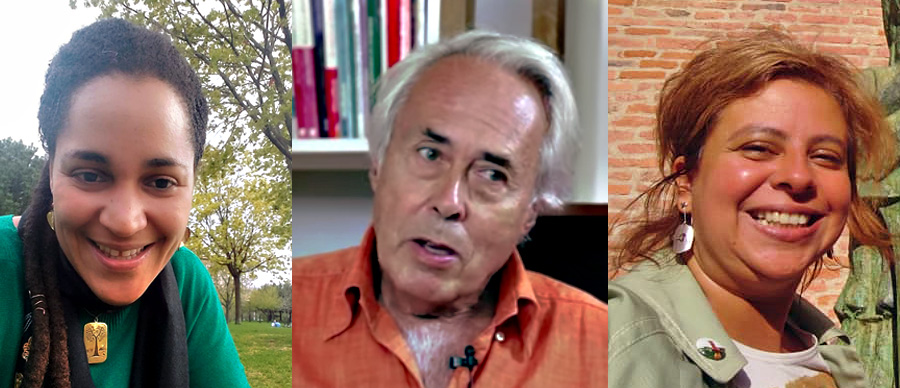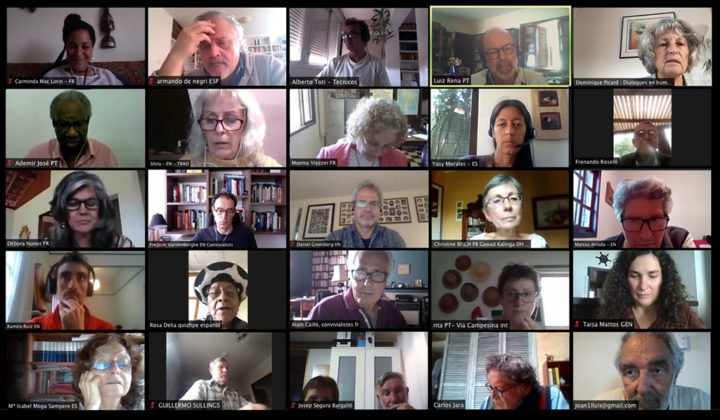The 2nd virtual meeting entitled “Multiconvergence of Global Networks”, held on August 29, 2020, was attended by representatives of eleven international networks and took place in an atmosphere of rich exchanges. The meeting was marked by the great diversity of approaches and the unity in the common engagement for a fair, solidary, democratic, and ecological world. A beautiful connection was established between people who care about the common good, both in the general plenary held in Spanish and in the four discussion rooms by language, Spanish, Portuguese, English, and French. This connection was enriched by the practices of small collective meditations at the beginning and end of the meeting, using a methodology proposed by the Humanist Movement, the network that organized the event. The tower of Babel, in which many dozens of people took part, ended with a fun collective singing of John Lennon’s “Imagine”, which represents the aspiration of a world without borders where people can live in dignity.
The perspective now presented for the continuity of the meeting is the exchange of information among the networks by sharing the contacts via e-mail of the people present and a new meeting on September 20 in the framework of the Viral Open Space network. There was a proposal to forward a common letter to international authorities presenting key documents of the networks present in the meeting, with the purpose of mutual strengthening. In the same way, the articulated networks will strive to get closer to other processes of convergence of global citizenship that are underway today, so that there will be a greater political impact to enforce the generous objectives of organized citizenship.
The perspective for the coming months is that other networks will take on other meetings so that we can move forward in a co-constructed process that will strengthen the networks that are already in the process, as well as others that will come.
Next, we will continue the dynamic of publishing the opinions of people representing the participating networks about the process of multi convergence, this time with the voice of Carminda Mac Lorin (Viral Open Space), Alain Caillé (Convivialism International), and Andrea Caro Gómez (FSM Economias Transformativas).
–How did you feel about this effort of articulation among the global networks?
Carminda Mac Lorin: This articulation effort fed my hopes of seeing networks that complement each other, but do not always communicate systematically, to get closer. If we want positive and lasting changes on a planetary level, bringing different perspectives closer together is fundamental – even if it represents a methodological challenge. And I must say that I am particularly enthusiastic about the experience of virtual encounters (this is also the bet of Viral Open Space). What would not have been possible only six months ago is taking shape, planetization seems to be expanding.
Alain Caillé: I felt like great news. My conviction is that we will not be able to prevent disasters of all kinds that threaten us (climate, environmental, financial, economic, social and moral) if we do not succeed in causing a radical change in global public opinion. It is a kind of moral revolution that we must carry out; and none of our networks can do it alone. It is therefore urgent to unite our forces and, for this, the form of the archipelago seems to me the best possible. A big thank you, therefore, to Débora Nunes for taking this initiative.
Andrea Caro: I think it’s important that we find time to exchange ideas, to share our realities, to grow together in humanity. The networks around the table seem to me to be promising spaces to continue to bring forth an archipelago of global citizens and to continue to foster solidarity among the peoples of the Earth in a spirit of united globality.
–What possibilities do you see for the future of this process of articulation and multi convergence among networks?
Carminda: In the current context of pandemic and exacerbated crises, this process of articulation can play an important role. It can even open moments for experimentation with methodologies and for real networking respecting particularities, and mutual recognition.
Alain: The second Manifesto of Friendship was signed by about 300 intellectuals and activists from 33 different countries. If this archipelago of global citizen networks really emerges and affirms itself, we can ask each one of them to mobilize internally and join in. I think this could quickly represent many people.
Andrea: –It seems to me that the process should bring moments of meetings that will make us continue to exchange until the WSF 2021 in Mexico so that we can continue to make cooperation emerge from there.

Carminda Mac Lorin, Alain Caillé, Andrea Caro Gómez
–What are the difficulties you encounter in such a global networking process?
Carminda: This process, like all the others that aspire to open spaces of approach to the various networks, presents in my opinion an important methodological challenge. How can we be together without the words of some occupying more space than others? How can we get out of the logic of competition that prevails today in most circles, even in so-called progressive initiatives? I don’t believe there is a magic solution. Instead, I believe that the search for participatory methodologies must be a path to persevere. Probably the exploration will be tortuous, we will make mistakes, then we will find ourselves exalted by the sweetness of the exchanges, we will celebrate deep and meaningful encounters, and then we will retrace our steps, with our old habits and our egos … And even then, we will have to continue, because it is this path full of paradoxes that will allow us to learn to act together.
Alain: The first difficulty is to make us understand that what penalizes us most in the face of the neoliberalism that dominates the world is the absence of a doctrine capable of superimposing itself on the great political ideologies of modernity (liberalism, socialism, communism, and anarchism, not to mention the diversity of inherited religions). These ideologies functioned as “secular religions”. That is why they were able to mobilize and channel passions. These are new passions (the passion to protect living beings and humanity) that we must create.
Andrea: The main difficulty for me is that we close ourselves off and stop working with all stakeholders, including institutions, although the rhythms are different. That is why it seems important to me to dedicate time and regularity through the Viral Open Space, for example (open space for exchange via internet in the spirit of the WSF).
–Knowing that global networks are multifaceted and not focused on a single theme, which theme do you think the network in which you participate should focus on for the joint action of global networks?
Carminda: There are so many issues that must be taken seriously, such as the situation of refugees, the dangers of nuclear energy, systemic discrimination, misinformation, populism, and fascism, just to name a few. However, I believe that the organizing collective of Viral Open Space must remain focused on building open spaces, where various people, groups and networks can feel close and learn from each other. This will allow, I hope, to multiply effective rapprochements, from local to global.
Alain: The postulate of convivialism is that the main challenge we must face (that from which all others derive) is to finally master what the Greeks call hubris, the desire for omnipotence, from which the planetary domination of financier and speculative capitalism and the insane explosion of inequalities that this entails is the most obvious expression.
Andrea: The World Social Forum on Transformative Economies is an important issue in itself, I think the vision of a political economy that does not exploit the lives of humans and that respects nature is undoubtedly one of the important levers to bring humanity together. Above all, because it is at the crossroads of its two themes that we can work on the essential foundations, the values that we want to see grow in society. The work on these founding values adopted by all will make it possible to define a territory of values. This human political community will be capable of adopting a new socio-environmental pact that can be based, for example, on the founding principles that Native American peoples call good living (“buen vivir”).
To access other articles published on this same subject, click here.






